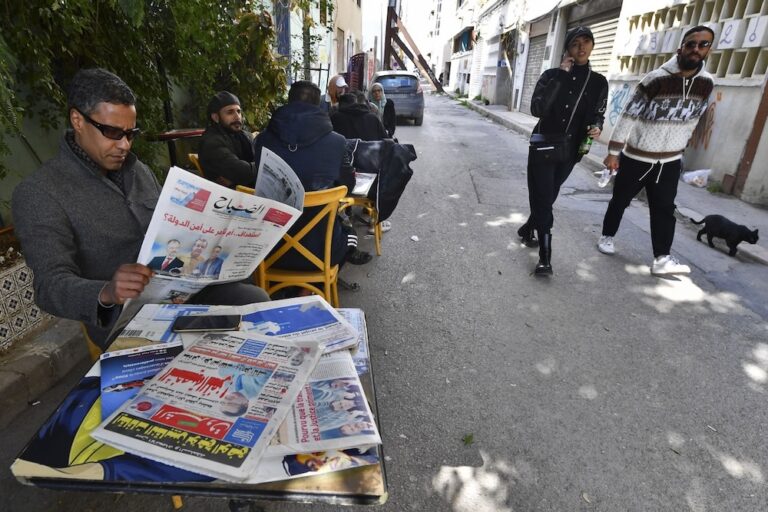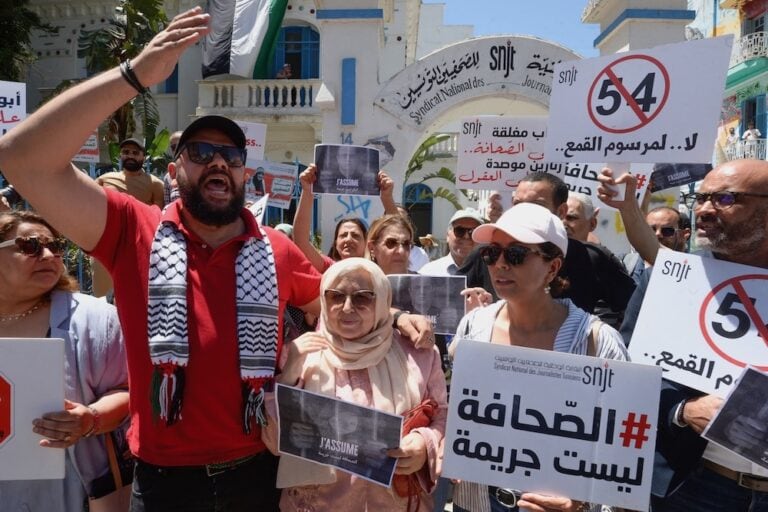Police reportedly arrested the bloggers to question them about hacking into government websites by the militant group Anonymous.
(RSF/IFEX) – Reporters Without Borders condemned the 6 January 2011 arrests and disappearances of bloggers and online activists in a number of Tunisian cities.
The worldwide press freedom organisation has monitored at least five such cases but the list could well be longer.
Police arrested the bloggers to question them about hacking into government websites by the militant group, Anonymous, several sources told the organisation.
Reporters Without Borders urged the authorities to release the bloggers as soon as possible. “These arrests, intended to intimidate Tunisian Internet-users and their international backers, are likely to prove counter-productive, by stoking up tension. Arresting several bloggers is not the way to get images of demonstrations deleted from the web or for cyber-attacks to be halted”, Reporters Without Borders said. “Stepping up the repression is absolutely not a solution to the crisis engulfing Tunisia today”.
Four or five police plainclothes officers arrested the blogger and activist Hamadi Kaloutcha ( http://www.facebook.com/Kaloutcha.Hamadi ) at his home on 6 January at around 6 a.m., seizing a computer and a central processing unit. They told his wife they were taking him to the nearest police station as they “just had a few questions for him”, and “it would only take a few hours”. There has been no news of him since.
Cyberdissident Sleh Edine Kchouk, a student activist, was arrested by police in Bizerte (north of Tunis) and his computer seized.
Tunisian rapper El Général – real name Hamada Ben Aoun – was also reportedly arrested in Sfax, about 270 kms southeast of Tunis. In his song, “President, your people are dead”, he challenged President Ben Ali over corruption and unemployment. His video is hugely popular among young Tunisians and widely circulated online. (See the video on: http://www.facebook.com/video/video.php?v=129701343760262&oid=153793954645919&comments ).
Furthermore, there has been no news of Slim Amamou and Azyz Amamy, two netizens based in Tunis. Slim Amamou ( http://twitter.com/#!/slim404 ) was briefly detained on 21 May 2010 just ahead of a demonstration against web censorship which he planned to hold outside the information ministry in the capital. Several human rights activists, who asked for anonymity, said he is being held at the interior ministry. Amamy apparently covered clashes a few weeks ago in Sidi Bouzid. His blog is currently inaccessible ( http://azyz404.blogspot.com/ ) and his Facebook page has been deactivated.
These arrests come as the authorities attempt to shore up censorship of the web to try to stifle political and social protest movements which are raging in the country at the moment, and to end cyber-attacks against government websites. Social networking sites have given unprecedented coverage to these events, while the traditional media, most of which are under the control of the regime, have stayed silent.
The regime is tightening censorship of online articles on international media about the current unrest. Meanwhile, Isabelle Mandraud, a journalist with the international service of the daily “Le Monde”, a specialist on the Maghreb, was denied entry to Tunisia on 7 January. The daily has been banned in Tunisia since its special correspondent Florence Beaugé was expelled in October 2009.


